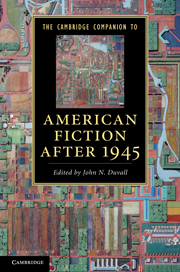Book contents
- Frontmatter
- Introduction: A story of the stories of American fiction after 1945
- PART I POETICS AND GENRES
- 1 Postmodern metafiction
- 2 Contemporary realism
- 3 New journalism and the nonfiction novel
- 4 Science fiction
- 5 The short story
- PART II HISTORICAL AND CULTURAL CONTEXTS
- PART III MAJOR AUTHORS
- Conclusion: Whither American fiction?
- Index
- Cambridge Companions to …
5 - The short story
from PART I - POETICS AND GENRES
Published online by Cambridge University Press: 28 March 2012
- Frontmatter
- Introduction: A story of the stories of American fiction after 1945
- PART I POETICS AND GENRES
- 1 Postmodern metafiction
- 2 Contemporary realism
- 3 New journalism and the nonfiction novel
- 4 Science fiction
- 5 The short story
- PART II HISTORICAL AND CULTURAL CONTEXTS
- PART III MAJOR AUTHORS
- Conclusion: Whither American fiction?
- Index
- Cambridge Companions to …
Summary
In Paris, on August 25, 1944, a trim, dark-eyed survivor of the Utah Beach landing sat down for a drink with a burly war correspondent who had written very famously about an earlier world war. At the time of this meeting, Jerome David Salinger was twenty-five years old, struggling to break into the exclusive pages of The New Yorker. At forty-five, Ernest Hemingway had already immortalized the psychic wounds of war and, along with James Joyce and Sherwood Anderson, had reinvented the short story as a modernist art form: spare and concrete, yet riddled with meaning. On the popular front, the slick magazines were publishing upbeat, neatly turned consumable fiction well into the 1940s. Salinger's clever potboilers, closer in spirit to F. Scott Fitzgerald's society sketches than to Hemingway's “Lost Generation” tales, had appeared in venues like Collier's. Hemingway knew of Salinger and praised a story the younger man showed him. Perhaps he caught a glimpse of the fallout to come.
In 1948 Salinger's gently explosive story, “A Perfect Day for Bananafish,” appeared in The New Yorker. Its hero, Seymour Glass, showing signs of what today would be called post-traumatic stress disorder, is on his honeymoon in Florida. Through an introductory conversation between the nail-polishing wife and her badgering mother, Salinger deftly characterizes the superficiality of postwar America. Seymour delights in puncturing complacency with antic non sequiturs.
- Type
- Chapter
- Information
- The Cambridge Companion to American Fiction after 1945 , pp. 68 - 82Publisher: Cambridge University PressPrint publication year: 2011
- 1
- Cited by



